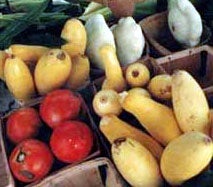 KINGSTON, R.I. – May 21, 2007 – A great deal of effort has been made by state and local agencies and groups in recent years to increase the number of farmers’ markets in Rhode Island and encourage residents to attend them.
KINGSTON, R.I. – May 21, 2007 – A great deal of effort has been made by state and local agencies and groups in recent years to increase the number of farmers’ markets in Rhode Island and encourage residents to attend them.
While these markets provide an additional revenue stream to local farmers, University of Rhode Island nutrition education outreach staff wanted to know whether the markets encourage healthier eating habits.
“We speculate that people who attend these markets eat more fruits and vegetables than those who don’t attend, but there is no hard evidence to prove it,” said Heidi Hetzler, a community nutrition educator working with the Food Stamp Nutrition Education Program at the URI Department of Nutrition and Food Sciences.
So Hetzler and URI nutrition students Jennifer Blake and Sarah Flinn visited 12 farmers’ markets last fall to survey those in attendance about their eating habits and the reasons for visiting the markets.
They found that 36 percent of those who volunteered to complete the survey reported that their attendance at the markets played a role in increasing their consumption of fruits and vegetables, and 78 percent noted that they had recently consumed all 12 of the nutrient-dense vegetables listed on the survey.
The top reasons the respondents listed for attending the markets were fun, quality and selection.
While many farmers’ market attendees are decidedly upscale, the URI researchers were pleased to note that 12 percent of respondents had paid for their produce purchases using food stamps or farmers market checks, the latter of which are available to low-income residents through community senior centers or the federal Women, Infants and Children program.
The survey was part of a larger URI project at farmers’ markets designed to encourage healthy eating patterns among low-income Rhode Islanders. Hetzler, Blake and Flinn conducted cooking demonstrations, offered samples of produce, gave out low-cost recipes that highlight fresh vegetables, and provided nutrition information to those in attendance.
“Most cooking demonstrations are done by chefs from upscale restaurants and the recipes they use are too complicated and expensive for most people,” Hetzler said. “Our demos were simple and practical, and the feedback we got suggested that the lower-income families were going to try them.”
Perhaps one of the most notable results of the URI outreach efforts at farmers’ markets was Hetzler’s observation that children appeared to particularly enjoy their experience at the markets.
“The kids seemed to be having a phenomenal time,” she said. “If these markets get them to enjoy the experience of eating fruits and vegetables, then farmer’s markets can be considered a great success.”
Additional research and outreach to encourage healthy eating habits will be conducted during the 2007 farmers’ market season. The project is one of many supported by the Food Stamp Nutrition Education Program. The URI College of the Environment and Life Sciences has also provided support for this and many other related outreach programs.

